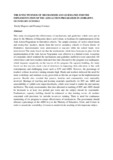Please use this identifier to cite or link to this item:
https://cris.library.msu.ac.zw//handle/11408/1589| Title: | The effectiveness of mechanisms and guidelines for the implementation of the AIDS Action Programme in Zimbabwean secondary schools. | Authors: | Muguwe, Emely Gwirayi, Pesanayi |
Keywords: | Effectiveness; Mechanisms and Gu idelines; Implementation; Aids Acti on Programme; School Heads; Teachers; Zimbabwe | Issue Date: | 2011 | Publisher: | Clarion University of Pennsylvania, Clarion, Pennsylvania | Series/Report no.: | Journal of Sustainable Development in Africa;Volume 13, No.3; p. 199-204 | Abstract: | This study investigated the effectiveness of mechanisms and guidelines which were put in place by the Ministry of Education Sports and Culture, to facilitate the implementation of the Aids Action Programme in Zimbabwe schools. The sample consisted of twelve school heads and twenty-four teachers, drawn from the twelve secondary schools in Gweru district of Zimbabwe. Questionnaires were administered to teachers while the school heads were interviewed. The study found out that the mechanisms which have been put in place for the implementation of the Aids Action Programme were effective to a limited extent. A number of constraints which rendered the mechanisms and guidelines ineffective were unraveled. All school heads and most teachers indicated that time allocated to the program was inadequate, which impacted negatively on the success of the program. On capacity building, the study found out that teachers made a lot of initiatives in improving their education in line with contemporary and challenging issues such as HIV and AIDS. However, the percentage of teachers without in-service training remains high. Heads and teachers indicated the need for more workshops and seminars at any given time as this has an impact on the implementation process. Results also revealed that parents, families and communities were minimally involved. Shortage of teaching and learning materials specifically for HIV and AIDS and unavailability of syllabi were major drawbacks, which were bound to render the mechanisms ineffective. The study recommended that time allocated to teaching of HIV and AIDS should be increased to at least two periods per week and the subject should be examinable. Furthermore, capacity building should be enhanced so that training covers all teachers concerned with provision for periodic in-service training. There is need for continuous monitoring of the program to ensure effectiveness of mechanisms. The government should allocate a percentage of the AIDS levy to the Ministry of Education, Sport, and Culture in order to sustain the availability of resources needed in the teaching of this important subject. | URI: | https://www.researchgate.net/publication/268241858 http://hdl.handle.net/11408/1589 |
ISSN: | 1520-5509 |
| Appears in Collections: | Research Papers |
Files in This Item:
| File | Description | Size | Format | |
|---|---|---|---|---|
| THE EFFECTIVENESS OF MECHANISMS AND GUIDELINES FOR THE IMPLEMENTATION OF THE AIDS ACTION PROGRAMME IN ZIMBABWE SECONDARY SCHOOLS.pdf | Abstract | 6.25 kB | Adobe PDF |  View/Open |
Page view(s)
156
checked on Feb 19, 2026
Download(s)
22
checked on Feb 19, 2026
Google ScholarTM
Check
Items in MSUIR are protected by copyright, with all rights reserved, unless otherwise indicated.



